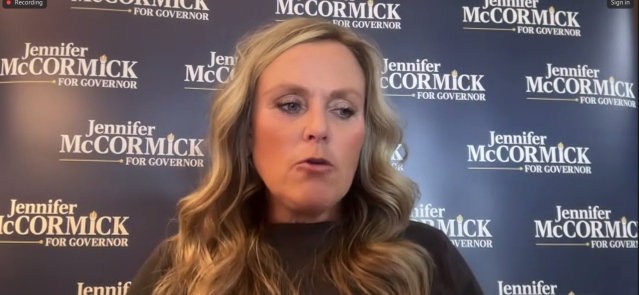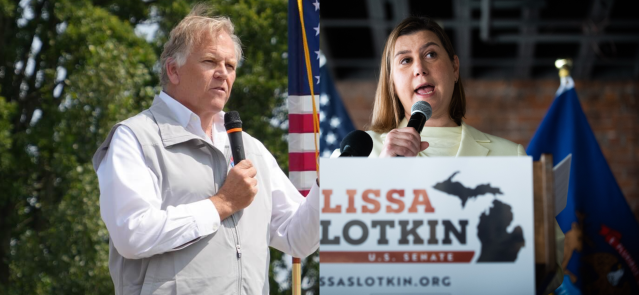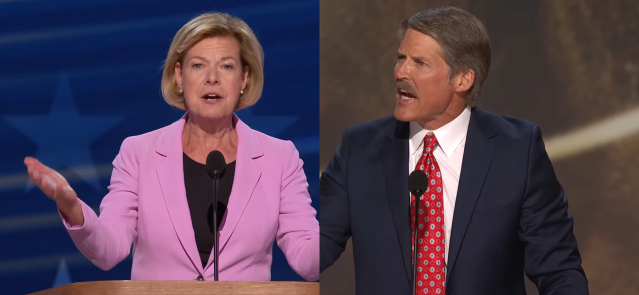Stay ahead of the curve as a political insider with deep policy analysis, daily briefings and policy-shaping tools.
Request a Demo
Republican gubernatorial candidate Mike Braun speaks with reporters on Sept. 6, 2024. (Credit: Tom Davies)
- Braun called for tougher state limits on prior authorization and noncompete agreements
- Braun campaign policy paper said it is time for “more ambitious work” from Legislature
- Democrat Jennifer McCormick said more investment needed in public health and health care infrastructure
Proposals from Republican gubernatorial candidate Mike Braun for addressing Indiana’s health care costs and improving access would push the Legislature to go further in some areas where it has been reluctant to do so.
Braun’s proposals released Thursday argue that Indiana’s business environment is hurt by high health care costs that discourage investment.
Braun called health care costs “a glaring weakness when it comes to attracting new companies and new residents.”
Braun has frequently talked about the challenges of health care costs during his campaign and said he would be active in pushing proposals with the Legislature.
“Solutions such as transparency, innovation, competition, and empowering consumers are not hard to figure out, and I will provide the leadership required to deliver solutions to lower the cost of health care for Hoosiers,” Braun said in a statement.
Braun’s proposals include placing restrictions on the ability of insurance companies to require patients to receive prior authorizations for medical care and extending prohibitions on employers making medical workers sign noncompete agreements, limiting their ability to take jobs with competitors.
Bills proposing similar steps in recent legislative sessions have either failed or been scaled back in the face of opposition from insurers and hospital networks, along with questions about the cost impact.
Braun’s campaign pointed to a new push on those topics.
“Over the last few years, the Indiana General Assembly has taken steps to put Indiana on a path towards health care affordability, and has set a firm foundation for more ambitious work,” said a policy paper from the Braun-aligned group Hoosiers for Opportunity, Prosperity and Enterprise that his campaign distributed.
Democratic gubernatorial candidate Jennifer McCormick’s campaign didn’t immediately reply Thursday to a request from State Affairs for comment on Braun’s plan.
McCormick said in a policy statement before Braun’s proposal was released that she believed “high health care costs and lessening accessibility are significant deterrents for businesses and people considering a move to Indiana.”
“Increasing Indiana’s investment in public health and health care infrastructure across the state — emphasizing the reduction of costs for vulnerable Hoosiers — will improve accessibility and turn the tide against the disappearance of rural health care providers,” McCormick said. “We will also incentivize companies to create wellness programs, reducing the long-term cost of care.”
The Braun policy paper said the state “should prohibit insurance companies from rescinding prior authorization after making a positive determination and require any denials to be made by a physician or medical professional with similar credentialing as the requesting physician.”
One of the top-priority bills of Senate Republicans last session aimed to prohibit insurers from requiring prior authorization for emergency services, routine care and prescription drugs. But it failed to advance amid concerns that it could push up the state’s health care costs if a decrease in prior authorization leads to state employees or Medicaid users utilizing more medical care.
The Braun plan also seeks a state law that would go further than new federal government regulations in banning noncompete agreements for medical workers.
Those federal regulations, which are being challenged in court, do not apply to non-profit entities — including several of Indiana’s largest hospital systems.
Braun proposes to “prohibit not-for-profit hospitals from requiring licensed medical personnel to sign employment contracts that include noncompete agreements.”
Despite a 2023 push to ban all physician noncompete agreements in Indiana, legislators ultimately just prohibited them for primary care physicians.
Another Braun proposal would require the release of data about negotiated rates and cash prices between insurance companies and medical providers for each billing code and shoppable service offered at a facility.
The policy paper argues such transparency steps would allow businesses to negotiate better coverage at lower costs.
“The health care sector has operated behind a shroud of secrecy, with little to no price transparency,” the paper said. “In the absence of transparency, prices have continued to rise at the expense of patients, employers, and the government. The State should adopt sweeping price transparency legislation to empower patients and nudge our health care sector towards the free market.”
Tom Davies is a Statehouse reporter for State Affairs Pro Indiana. Reach him at [email protected] or on X at @TomDaviesIND.
Know the most important news affecting Indiana
Get our free weekly newsletter that covers government, policy and politics that impact your everyday life—in 5 minutes or less.
McCormick’s economic plan: Fewer tax breaks, greater focus on worker retention
Democratic gubernatorial nominee Jennifer McCormick proposed a retooling of the state’s budget and economic development strategy to prioritize individual Hoosiers’ needs — child care, education, health care, better maintained cities and an expanded earned income tax credit — as part of a business and economic platform rolled out Thursday morning. “Our approach is balancing that …
Indiana gubernatorial candidates lay out contrasting visions for education
Should Indiana expand the use of private school vouchers? Do teachers deserve a $60,000 salary minimum? Does state testing need to be abolished? The three candidates vying to be Indiana’s next governor have offered varied responses to these questions and others as they look to reshape the state’s education system. Here is how U.S. Sen. …
Rogers, Slotkin lean into China, national security in US Senate battle
LANSING, Mich. — Michigan voters are faced with a choice for U.S. Senate in November between two candidates with strong national security credentials but with sharply different views on how to effectively address threats to the U.S. Both Southeast Michigan candidates, Republican Mike Rogers of White Lake and Democratic U.S. Rep. Elissa Slotkin of Holly, have been …
Tammy Baldwin faces tough reelection: Can Trump supporters push her past the finish line?
MADISON, Wis. — Tammy Baldwin may need some Donald Trump supporters to secure her reelection. The two-term U.S. senator plays up the “buy American” language she pushed for federal infrastructure projects and touts policies favored by Wisconsin’s dairy industry such as seeking to ban labeling plant-based products “milk.” Her GOP rival Eric Hovde, meanwhile, wants …




